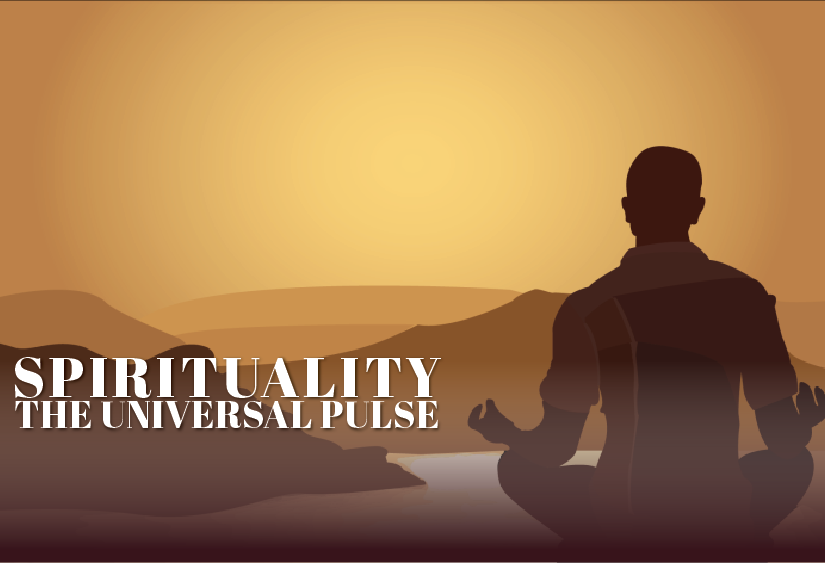
Article by
Spirituality can be characterized generically as a search for the divine, a process of human transformation, and a desire for a deeper meaning in life. Spirituality, which is often described as the connection beyond the material world, transcends personal beliefs and cultural barriers. Spirituality is seen as a universal human experience because it addresses fundamental concerns about existence and purpose. Its expression is profoundly individualistic, influenced by personal ideas, experiences, and cultural circumstances. At its core, spirituality is the search for deeper understanding—a link between the physical world and the fundamental mysteries of life.
Spirituality is a common line that runs through all religious traditions, though it is expressed differently. In Buddhism, spirituality is deeply rooted in the Four Noble Truths and the Eightfold Path, providing a framework for understanding and overcoming suffering to achieve enlightenment. The Four Noble Truths teach that suffering is an inherent part of life, caused by craving and ignorance, but it can be overcome by following the Eightfold Path. This path consists of eight interconnected practices: Right View, Right Intention, Right Speech, Right Action, Right Livelihood, Right Effort, Right Mindfulness, and Right Concentration.
These principles guide practitioners toward ethical conduct, mental discipline, and wisdom, fostering spiritual growth. Christian spirituality centers on a personal relationship with God through faith in Jesus Christ, embracing His teachings as a model for love, humility, and compassion. Practices like prayer, worship, scripture meditation, recitation of Bible and sacraments deepen this connection, offering hope through eternal life and inspiring believers to trust in God, find peace in challenges, and embody Christ-like virtues. Hindu spirituality is a personal journey to understand the self and its connection to ultimate reality, rooted in concepts of duty, action, and liberation.
Practices like meditation, yoga, devotion, selfless action, and pursuit of knowledge, guided by texts like the Vedas and Bhagavad Gita, lead to self-realization and harmony with the universe Islamic spirituality is centered on a deep connection with Allah, emphasizing submission, devotion, and moral integrity. Through practices like prayer, fasting, charity, and Quran recitation, Muslims cultivate mindfulness, compassion, and inner virtues such as humility, patience and gratitude. The goal is to attain closeness to Allah, live according to His guidance, and achieve peace in both this life and the hereafter. Jewish spirituality centers on the relationship between God and humanity, focusing on covenant, prayer, and ethical living.
Through commandments, prayer, Torah study, and observing Shabbat, individuals align with divine will and create holiness in daily life. It also emphasizes repairing the world, fostering moral responsibility, community, and closeness to God. T.S. Eliot’s poem The Hollow Men is a stark critique of modernity, portraying the spiritual emptiness of contemporary humanity. Eliot describes modern individuals as "hollow men" and "stuffed men," filled with meaningless rituals and devoid of spiritual depth. The lines, “We are the hollow men / We are the stuffed men / Headpiece filled with straw,” highlight the superficiality and lack of purpose that define modern existence. It explores spiritual emptiness as a universal and personal experience, transcending religious or cultural boundaries. The "hollow men" symbolize existential despair, disconnected from both divine transcendence and inner life. Spirituality in ancient philosophy was a profound exploration of the self, the cosmos, and the pursuit of a meaningful life. Philosophers like Socrates, Plato, and Aristotle in ancient Greece emphasized the cultivation of the soul, ethical living, and the search for truth as pathways to spiritual fulfillment.
Plato's philosophy viewed the soul as eternal, striving to transcend the material world and align with the ideal realm of forms, while Aristotle focused on achieving flourishing through virtuous living. The Stoics, such as Seneca and Marcus Aurelius, emphasized inner peace and resilience through rationality, acceptance of nature’s order, and living in accordance with universal reason (logos).
خودی کو کر بلند اتنا کہ ہر تقدیر سے پہلے
خدا بندے سے خود پوچھے بتا تیری رضا کیا ہے
This verse from Allama Iqbal reflects a profound connection between Khudi (selfhood) and spirituality, illustrating that true spiritual growth involves cultivating one’s inner self to align with the divine. For Iqbal, Khudi is not the ego in a materialistic sense but the realization of one’s inner potential and connection to the Creator.
Khudi is achieved through self-awareness, moral development, and a deep connection with God. Khudi elevates a person spiritually, becoming a co-creator with God and contributing to humanity’s betterment, bridging the individual and the divine in transformative ways.
 Monthly "Azeem English Magazine", launched in 2000, records the information about diverse fields like mental health, literature, research, science, and art. The magazine's objective is to impart social, cultural, and literary values to society.
Monthly "Azeem English Magazine", launched in 2000, records the information about diverse fields like mental health, literature, research, science, and art. The magazine's objective is to impart social, cultural, and literary values to society.
+92 51 88 93 092
First Floor, RAS Arcade, Eidhi Market, Street#124, G-13/4, Islamabad, Pakistan, 44000.